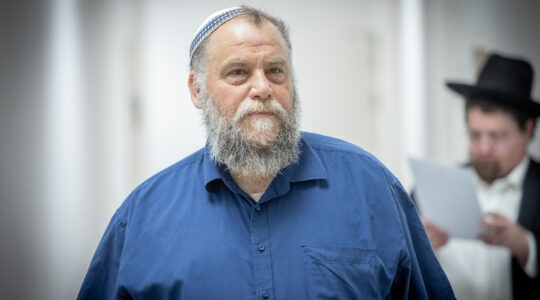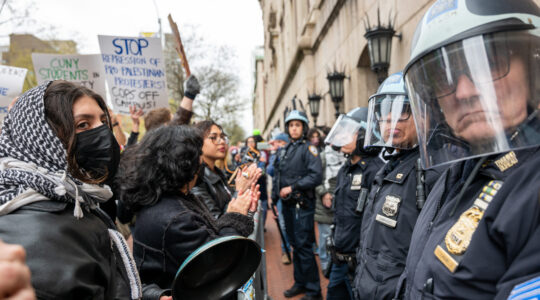WASHINGTON (JTA) — Jewish organizational leaders emphasized Iran, but also made time to discuss domestic issues including climate change and health care, when they met with Democratic U.S. senators.
Each of the four Jewish leaders tapped to make opening presentations to the senators Wednesday started by saying that Iran was the most critical issue for the Jewish community. They then moved on to other issues.
Rabbi Steve Gutow of the Jewish Council for Public Affairs, a public-policy coordinating body comprised of the synagogue movements, several national organizations and local Jewish communities across North America, focused on climate change and the environment. Ken Jacobson of the Anti-Defamation League discussed hate-crimes legislation.
AIPAC’s Howard Kohr talked more about Iran and praised the Obama administration for Gen. Keith Dayton’s continued progress in building security in the West Bank. And David Harris of the American Jewish Committee criticized elements of President Obama’s Cairo speech and talked about the U.S.-Israel relationship.
The senators then called on representatives of the 14 other groups invited, and they brought up health care and other matters.
An annual get-together organized by the Democratic Outreach and Steering Committee, the meeting was chaired by Sen. Debbie Stabenow (D-Mich.) and included members up and down the pecking order, from Senate Majority Leader Harry Reid (D-Nev.) to the newest senator, Al Franken (D-Minn.).
The 22 senators on hand for at least a portion of the one-hour meeting was believed to be a record for participation, according to one person who attended.
While one participant noted that because the Jewish leaders spoke so much, the senators didn’t have a chance, the lawmakers did respond to some presenters. One participant said that Sen. Carl Levin (D-Mich.) told the group that their help was still needed to pass legislation expanding federal government involvement in investigating hate crimes. Both houses of Congress have passed the legislation, but it still faces a conference committee.
That participant also said that Reid called Israel “our best friend in the world.”
Harris’ remarks were a prime topic of discussion afterward for some participants. The AJC executive director criticized Obama’s Cairo speech for linking the creation of Israel to the Holocaust without mentioning the 3,500-year Jewish ties to the land. Harris also said the president had placed much more of an onus on Israel than the Arab world by specifically mentioning the need to stop settlement construction.
But one meeting participant believed that Harris’ lengthy remarks were overly critical of the president, particularly because the remarks were so focused on the Cairo speech and did not take into account what had occurred in the weeks since — and the fact that Jewish leaders had specifically discussed the emphasis on the settlements issue with Obama at the White House last week.
The participant also was disappointed that the senators did not call on anyone from the left-wing pro-Israel groups to provide an alternative viewpoint on Obama’s Mideast policies.
The last person to be called on was the director of the Washington office of American Friends of Lubavitch Washington, Rabbi Levi Shemtov, who offered a d’var Torah with the message that “just as there is more than one way to be pro-Israel, there is more than one way to be pro-peace.”
“Show me a Jew who is against peace and I would like to know what his Jewish source is,” Shemtov said he told the group. “Show me a Jew who doesn’t want a decent life for Palestinians,” and he’ll ask what his Jewish source is.
Shemtov said his remarks were not meant as a criticism of anyone but that he simply wanted to emphasize that “fundamentally, there does not need to be a conflict between people of the Jewish faith and people of the Muslim faith.”
“While we obviously have theological differences,” he said, “they shouldn’t be the basis for conflict.”
While some say that peace needs to be “imposed” on the Middle East, Shemtov insisted that “the Jewish quest is for peace” — and that it is conflict that has been “imposed” on the region.
One representative of a left-wing pro-Israel group praised the rabbi’s remarks.
“He was very positive,” said Steve Masters, president of Brit Tzedek v’Shalom. “It was very clear he feels being pro-peace is an essential part of being a Jew.”





